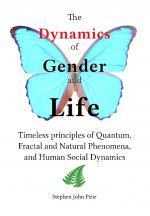[Excerpt Be and Become, © ProCreative, Sydney 2000]
Despite the reasonable expectation mentioned earlier that the universe is somehow self-aware, the idea can remain so utterly foreign to many of us1 simply because we have never learned to expect that it might indeed be “self-aware.” It follows that if the universe is as suggested by the physicists, then our lack of awareness of such is because we have not yet developed our awareness and understanding sufficiently to recognize it.
The degree to which we remain separate from the world, is the degree to which we lean towards or consciously identify with being “particle orientated.” The particle nature is the quality of being “separate from” other things, people, events and feelings. The particle-physical nature, as shown in the TOA in the next chapter, is about definition, exclusiveness, objectivity, separateness, boundaries, measurement etc. Its about quantifying objects, things, particles and events—in short, it’s all about the discrete, measurable bits and pieces of space and time (events).
The wave nature, on the other hand is about the emotional gaps between things—the subjective, indefinable emotional relationships between objects, people and events. The wave nature is about how we connect with others and the world around us. The wave nature is an inclusive, open, unlimited interrelatedness. The wave nature is not able to be quantified or measured. Try for example putting a “measure” on friendships and observe how long those friendships remain intact. Such things as friendships and relationships are matters of the heart and cannot be quantified. Quantification, definition and measurement are aspects of “separateness.” In the table of One and All, I have correlated “separateness” with science, objectivity and definition. As already mentioned in Chapter Three, science is the objective discipline of measurement and is not in any way able to meaningfully deal with subjective feelings and emotions. It is simply not possible to define that which is indefinable. As soon as the indefinable is defined, it is no longer indefinable. This is why sciences such as psychiatry and psychology are largely ineffective for they are sciences applied to a subjective realm, which by definition is beyond the reach of objective science. Whenever you attempt to limit or define that which is subjective and unlimited, you end up with something which is objective, quantified and limited.
In the film “Dead Poets Society” we saw a powerful portrayal of this realization when Mr Keats (played by Robin Williams) ordered his students to rip out sections of a text book which taught we can measure and quantify a poem. He then knelt down and with his students in a hushed huddle around him, urged them to feel the juiciness and mystery of life, not its metric, measurable qualities. Poet Samuel Taylor Coleridge said that “the best art internalizes the external, and externalizes the internal.” Science also needs to marry the External-Known (Intellect) and the Internal-Unknowable (Emotions) if it is to gain a deeper relevancy.
When we overly identify with the particle nature, we downplay our wave nature. For example, usually the more logical and intellectual one is (refer the table of One and All, lines 14 and 60 resp.), the less intuitive and emotional the person. The more you use, or are able to abuse an object, person or event, generally the less you relate to it.
A strong identification with the particle nature often leads to an almost complete disregard for the well-being of others and is the reason behind the countless atrocities inflicted upon man by man throughout the ages.
People, in such circumstances are seen as things, objects to be mistreated, abused or disposed of at will. As indicated earlier, almost universally throughout the animal kingdom and human society, males have been the aggressors. As author Francis Fukuyama noted:
In every known culture, and from what we know of virtually all historical periods, the vast majority of crimes, particularly violet crimes, are committed by men.2
The angst in modern society is largely due to the over-identification with the particle (objective-factual-known) nature of existence while discounting the spiritual (infinite, mysterious, unknowable). As covered earlier, the spiritual (Mysterious-Uncertain-Unknowable) is a vital component to be welcomed and “mastered” if one is to find happiness.
- 1. I need to include a footnote here that the “us” I refer to is meant as a general reference to those who were raised within modern “Western” technological cultures. It should be recognized that it generally excludes those who have been raised within native cultures, most of who maintain a sense of “oneness” with the world around them. In Australian aboriginal culture, trees and rocks, for example, are treated like people with abilities to communicate with, and relate to, their environment.
- 2. The Weekend Australian, News Ltd, Sydney, September 19, 1998 page 23, Focus Section. {Edited excerpt of an essay by Francis Fukuyama in the September Issue of Foreign Affairs journal}
 "The Dynamics of Gender and Life" ebook is now available at
"The Dynamics of Gender and Life" ebook is now available at